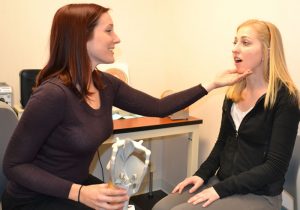The vocal folds are a group of muscles located in the airway. As air passes over them they vibrate, making sound. We all may have experienced vocal issues from time to time, most of them minor. Excessive talking or screaming, exposure to smoke and other irritants, colds, allergies, and upper respiratory infections can all cause hoarseness, a temporary condition that is more an annoyance than anything else. Continuing to use your voice inefficiently – speaking too loudly or quietly, using the wrong pitch, vocal overuse – may lead to more serious problems. Some medical conditions may result in changes in voice quality and professional voice users including singers, performers and school teachers, are often at a high risk for vocal difficulty. If you are experiencing a voice or upper airway disorder you may benefit from the services we provide here at the Northwestern University Center for Audiology, Speech, Language, and Learning (NUCASLL) in conjunction with a laryngologist (an ENT with specialized training in voice and upper airway disorders.

Our Services
Voice Evaluations with a Speech-Language Pathology Team
The voice specialists at the Northwestern University Center for Audiology, Speech, Language, and Learning can provide an in-depth assessment of your voice through standardized voice evaluation measures. During an evaluation, our clinicians will take your history, determine your concern with your voice, and complete formal testing. A voice evaluation will provide a quantitative and qualitative analysis measure of voice quality, pitch, resonance, and loudness. Evaluations are also offered for individuals who may be at risk for developing a voice disorder and desire baseline measurements and general information regarding healthy use and care of the voice.
Voice Treatment
Once you have received an evaluation, our specialists may recommended follow up treatment. Our treatment sessions are individualized and based on your evaluation results. Sessions are tailored to the needs of each client using goal-driven activities. Sessions often include simulated experiences to help clients improve effectiveness when speaking or singing.
Additional Information:
American Academy of Otolaryngology — Head and Neck Surgery: World Voice Day
